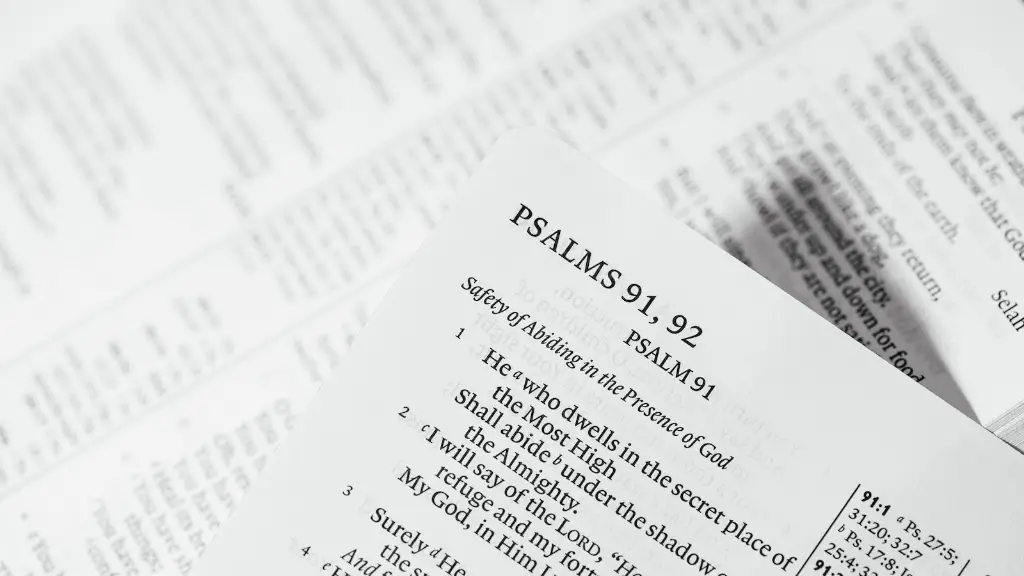In 16th century Protestant Christianity, the Apocrypha was removed from the Bible, which encompasses the Old and New Testaments. The Apocrypha is a series of books which provide further details about the Biblical forces behind the Jewish and Christian faiths. The Apocrypha was included in some versions of the Septuagint, a translation of the Hebrew Bible into Greek, and was present in the Eastern Orthodox church. It was not, however, included in the Protestant Bible. This variation led to the rise in popularity of Protestantism as well as the decline of traditional Catholic doctrines.
The primary reason behind the removal of the Apocrypha from the Bible was disagreements over the interpretation and application of the Apocryphal books. Protestant theologians generally concluded that the Apocrypha was not necessary for understanding or understanding the Christian faith, since Jesus had not referenced them or approved them as necessary reading. Secondly, they determined that the Apocrypha was not inspired either by God or by the works of the Old Testament prophets, as the New Testament books were. As a result, the Apocrypha was deemed superfluous in Protestant Bibles.
The decision to remove the Apocrypha was highly controversial. There were many arguments on both sides of the debate. The Council of Trent, the Third Lateran Council, the Synod of Jerusalem, and a host of other synods, councils, and battles fought fiercely over the issue of the Apocrypha. Some argued that the Apocrypha was authoritative, and that it should be officially recognized by the Church. Others argued that the Apocrypha had not been divinely inspired, and was therefore unworthy of being included in the Bible.
The Apocrypha was eventually omitted from Protestant Bibles. Considering the number of debates and councils that took place in regard to the Apocrypha, it is clear that the removal of the Apocrypha was not a quick or cheap decision. Rather, it was a lengthy journey of debate and eventual compromise by Protestants that brought forth the exclusion of the Apocrypha from their Bibles.
In modern Christianity, the disputes in the Apocryphal debate continue. Although many Protestant theologians remain firm in their opinion that the Apocrypha does not belong in Bibles, there are a few dissenting voices. Some Catholics continue to regard certain books of the Apocrypha as divinely inspired. They believe that the works should be included in Bibles, especially where it might be used to explain the teachings of the Catholic Church. While there may be valid arguments on both sides, the controversy over the Apocrypha will likely continue for years to come.
The History of The Apocrypha
The Apocrypha is an ancient collection of books which were widely accepted in the first century of Christianity. Most of the books were written in Greek, and were included in the Greek translations of the Jewish scriptures known as the Septuagint. Some of these books refer to events that took place during theperiod of Jewish history between the exiles from Judah in 587 B.C. and the arrival of Alexander the Great in 332 B.C., which is known as the Intertestamental Period. The Apocrypha also contains works by authors such as Baruch, Sirach, Judith, and Maccabees, who did not live during the Intertestamental period and are not mentioned in the Hebrew Bible.
The Apocrypha was accepted as canon by some groups of early Christians, and it was included in the official canon of the Septuagint. It was also included in some versions of the Vulgate, the Latin translation of the Bible. However, by the fourth century, the Apocrypha had been questioned and eventually was removed from the official canon of both the Vulgate and the Septuagint.
The Meaning of Apocrypha
The term “Apocrypha” comes from the Greek word apokryphos, which means “hidden” or “secret”. This term was originally applied to books which were not meant to be widely known or read by the public. In Christianity, the books which were considered “apocryphal” were those which were considered to have been either written too late to be included in the Bible, or written by authors whose reliability was doubtful. It is because of this doubt that many theologians removed the Apocrypha from their Bible versions.
The writings in the Apocrypha are sometimes used to further interpret certain passages in the Bible. For example, the book of Judith includes a story which is related to the story of Esther in the Hebrew Bible. Esther’s story of her rescue of the Jews is paralleled by Judith’s encounter with the enemy Holofernes, who threatened to destroy the Jews. This kind of comparison and contrast can be used to further explore the history behind the Bible, but it is not seen as necessary to the spiritual interpretation of the Bible by many theologians.
The Impact of the Apocrypha’s Removal
The removal of the Apocrypha has had a profound impact on the practice of Christianity in the West. Since the Apocrypha was removed from the Protestant Bible, it has become more difficult for Christians to understand certain Biblical teachings and view the Bible as a unified work. While some Protestants embrace the teachings and traditions of the Catholic Church, many have rejected many of them and have formed their own denominations based on a belief system that excludes the Apocrypha.
The removal of the Apocrypha has also led to alternate translations of the Bible being published. Many Protestant Bibles are now published without the Apocrypha, or with very limited sections of it included. This has made it easier for people to find a Bible that suits their particular theological view. However, it has also caused some confusion concerning the teachings found in the Bible, since not all translations contain the same books.
The Value of The Apocrypha
Despite the controversy over the Apocrypha, it still provides valuable insight into Jewish and Christian history. The books of the Apocrypha provide more information about the intertestamental period and the events which shaped the development of Christianity. The books also provide cultural context for many of the characters and stories found in the Bible, which can assist in understanding some of the more difficult passages. The wisdom contained in many of the books further contributes to the body of knowledge which is useful for those studying the Bible.
In addition, the Apocrypha has been the source of several modern works of literature, art, and music. Many of the stories contained in the Apocrypha are still being retold or adapted in different forms. For example, the story of Judith has been made into an opera, a television production, a ballet, and a movie. This demonstrates the continuing fascination with these books, despite the disagreement over their authority and reliability.
The Debate on the Authority of Apocrypha
The debate surrounding the authority of the Apocrypha continues to this day, although with much less urgency. Protestants generally consider the books to be of lesser authority than the Bible, while Catholics regard certain books of the Apocrypha as helpful to understanding the faith. As a result, the Apocrypha remains an interesting and important discussion topic for both Protestant and Catholic theologians.
The importance that the Apocrypha holds for Christians varies from denomination to denomination. While it does provide some interesting stories and history, many denominations do not consider it to be authoritative or necessary for understanding the Bible. Nevertheless, the Apocrypha has provided insight into some of the history behind the Bible, and it continues to play a role in some of the literature, art, and music that is used to convey its teachings.
The Preservation of The Apocrypha
In spite of its disputed authority, the Apocrypha has retained its place in the Christian faith. It has been copied and reprinted throughout history, and it is still available in different versions. Many denominations have published their own versions of the Apocrypha, containing works which they consider to be authoritative. The works are generally not included in Protestant Bibles, but they can be purchased or read online. The books, while often overshadowed by the Old and New Testaments, have still provided valuable insight into the Scriptures and continue to be studied by theologians and laymen alike.
The Reception of The Apocrypha in Modern Christianity
In modern Christianity, there is still considerable disagreement on the place of the Apocrypha in the Bible. The debate over its authority and reliability continues among Protestants, Catholics, and Eastern Orthodox. Although the Apocrypha has been rejected from the Protestant Bible, it does provide valuable historical and cultural context for many of the Bible stories. The stories are still being reinterpreted and retold in different forms, providing Christians with a different perspective on Biblical events.
Regardless of which side of the debate one takes, the Apocrypha still offers much insight into the history of Christianity and provides valuable demonstrations of the principles of faith, love, and justice that are essential to the Christian faith. And while the ultimate authority of the books remains disputed, the Apocrypha has still retained a place in the hearts and minds of many adherents of Christianity.
The Significance of The Apocrypha for Biblical Study
The Apocrypha provides invaluable insight into how the Bible has been shaped throughout history. By reading it, we can gain a better understanding of how the Bible was interpreted and applied in the early church, which can provide us with a better understanding of some of the difficult passages and principles in the Bible. Not only that, but the Apocrypha contains stories and teachings which can be directly applied to our lives. The books may not be considered canonical, but they are still full of spiritual and moral truths which are applicable in today’s world.
The Apocrypha can also provide students of the Bible with an alternative view of the Text. While some passages of the Apocrypha may not agree with those of the Bible, the differences can provide readers with opportunities for deeper exploration. Furthermore, by comparing the Apocrypha with the Bible, we can gain a better understanding of the context and culture which produced the Text. This understanding can be invaluable for anyone wishing to better understand the Bible.
The Role of The Apocrypha for Believers
The Apocrypha can also be an invaluable source of encouragement and inspiration for Christian believers. By reading the Apocrypha, believers can gain a better understanding of the struggles of their spiritual forefathers and learn how they responded with faith and courage in the face of difficulty. Furthermore, the books contain many exhortations and teachings which are applicable in our lives today. The Apocrypha can provide believers with the strength and courage to continue in the faith and make a difference in their communities.
The Apocrypha has been a controversial topic for centuries and is likely to remain so in the future. Nevertheless, it still provides valuable insight into Christian history and spirituality, and offers invaluable guidance and encouragement to believers today. While the Apocrypha may not take the place of the canonical Text of the Bible, it can still provide useful information on the culture and context which produced it, and its stories and teachings still have relevance for the spiritual lives of believers.





